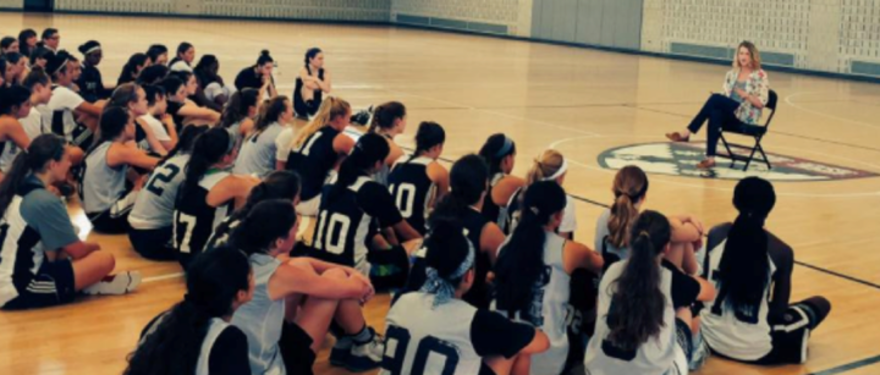"Nice talking to you as well!" I hung up the phone and looked out the window of my company's conference room, high above midtown Manhattan. I had just finished a call regarding my acceptance to HBS with Matt Segneri, Director of the HBS Social Enterprise Initiative, and it was an impactful one. Not only was I impressed that he made time to chat with me, but he also seemed very warm and genuine on the phone. I already knew that HBS had an incredible MBA program--that call demonstrated to me the culture and type of people I would be surrounded by. After speaking to Matt, I knew that HBS was the right place for me.
To understand why I came to HBS, we need to start at the beginning. I was born in Goodrich, a town of about 100 people in central North Dakota. My town is so small, it doesn’t even have a grocery store, and there were just two of us in my public high school graduating class. Yes, you read that correctly. I was a tall, lanky kid that loved basketball above nearly everything else, and after mailing a highlight tape to universities nationwide, I was buried under a tidal wave of recruiting attention from college basketball coaches. Despite my excitement, it was a really stressful time in my life.
I know what you might be thinking. Full scholarship offers and lots of people showering you with attention? I would’ve killed to be in that situation. You’re absolutely right to think that, and the highs I felt during that period in my life were incredible. But, I was also a 16-year-old kid unprepared to handle the stress and pressure that accompanied that amount of attention, and the weight of my college decision nearly crushed me. As a first-generation college student, I had no idea what I wanted from my college experience in terms of academic and personal factors, and consequently, I focused solely on basketball. Does this team win a lot of games? Do I think I’ll get to play? Did I have fun on my recruiting visit? Despite my highly flawed decision-making process, I landed at the University of Kansas, a great basketball school that thankfully is also a great school, period.
However, my luck in choosing Kansas doesn’t mean my time as a collegiate student-athlete was easy. Far from it. Did you know that the average Division I athlete spends nearly 40 hours per week on athletic commitments? Team practice, individual skill work, weights, team meetings, film review, scouting reports, travel, community events...it adds up quickly, and it’s not just during season. We trained year-round. Add college courses to the mix, and you are looking at 70-80 hour workweeks, with at least 25% of the time dedicated to intense physical exertion. Being a college athlete was an incredible experience that I will cherish forever, but I was exhausted for most of it. And while I developed study strategies and time management skills, it was a steep learning curve. Coming into college, I wish I had been more prepared to balance school and sport effectively.
The desire to use my experiences to help other athletes is what led me to found Trey. Trey is the first to combine objective team-specific information with individualized recruiting advice in order to empower athletes in the recruiting process. Our online platform provides education and personalized advising to prospective college athletes, enabling them to successfully navigate college recruiting, and preparing them to succeed as collegiate student-athletes. By informing the college decision process and teaching skills to balance school and sport at the collegiate level, Trey equips athletes to use sports as a springboard to lifetime success.
Without HBS, there simply is no Trey, because Trey has been the beneficiary of nearly every HBS entrepreneurial program. First, we participated in the inaugural Startup Bootcamp, an immersion program for first-year students that uses a learning-by-doing approach to build skills required to succeed as an early stage entrepreneur. Next, we advanced to the semifinal round of the New Venture Competition (NVC), an annual entrepreneurship competition that awards $300,000 in cash prizes to HBS startup ideas. Besides practicing our pitch through NVC, we received valuable feedback on our idea from a variety of social impact investors.
The support from HBS continued from there. An HBS Social Enterprise Summer Fellowship enabled me to continue working on Trey full-time as my summer internship. This fall, Trey was accepted into the Venture Incubation Program (VIP) and the Rock Accelerator, two programs that are providing us the mentorship and funding required to transform our idea into a market-ready product.
HBS has turned out to be the entrepreneurial ecosystem I had hoped it would be. I’ve been blown away by the level of mentorship and support available to HBS students, and the genuine excitement and interest in Trey exhibited by my professors, staff, and peers. Transforming my passion for helping other athletes succeed into a reality has been a wild ride so far, and there’s no better place I’d rather do it than at HBS.
Rebecca L. Feickert (MBA 2018) is the co-founder of Trey, a social enterprise that helps prospective college athletes use sports as a springboard to lifetime success.
Blog
Blog
MBA Voices
MBA Voices

- 29 Nov 2017
HBS, A Dream and Trey: How HBS Helped Me Launch My Social Enterprise
The views and opinions expressed in the MBA Voices blog are those of the authors.
Any political views shared by students are their own; HBS does not endorse a
particular party or candidate.
